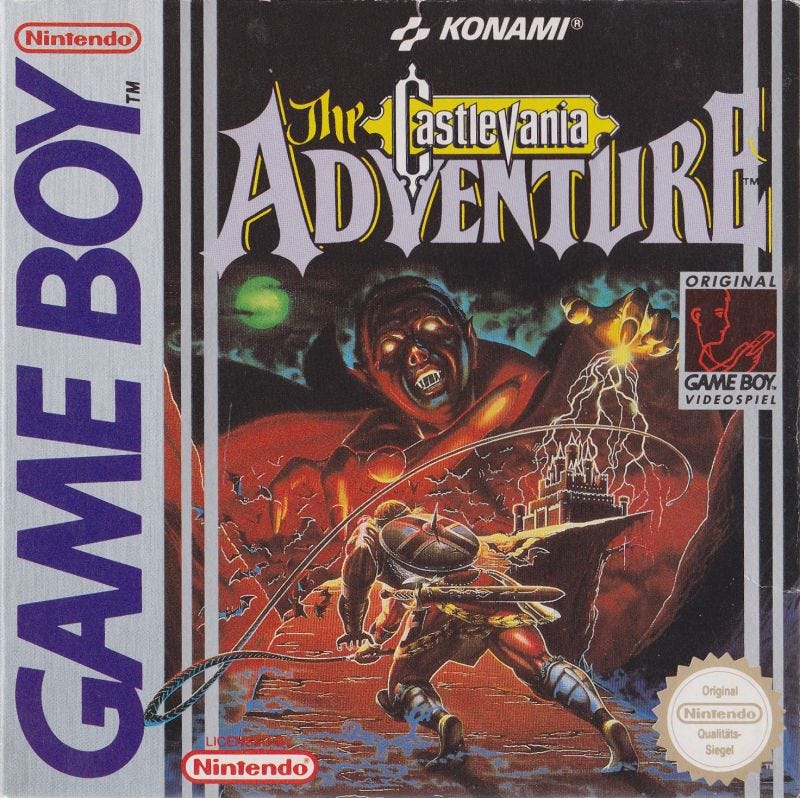Digging Through Hidehiro Funauchi's Game Boy Soundtracks
A look back at the composer's brief, impressive, and prolific career.
In the fall of 1989 Hidehiro Funauchi earned his first composer credit alongside Atsushi Fujio and Katsuhiko Suzuki for the Family Computer game TwinBee 3: Poko Poko Daimaō. His debut effort ended up being his only non-Game Boy credit in his brief but fruitful career as a Konami video game musician.
He collaborated with Shigeru Fukutake and Norio Hanzawa on the score for Castlevania: The Adventure in 1989. Though the game itself didn’t garner great reviews, people praised the listening experience that accompanied the visuals. “The monochromatic color palette holds back the dreary environments from coming to life, but the Game Boy’s terrific stereo audio provides an aural treat,” Tim Turi wrote in a 2012 Game Informer article. The cover art is also extremely badass.
One year after making his entrance into the industry with TwinBee 3, Funauchi achieved his first solo scoring credit with Skate or Die: Bad 'N Rad. Numbers like “Level Select” demonstrate how Funauchi’s unique sound was developing at the time.
After Skate or Die it was off to Operation C, where Funauchi once again had the freedom to flex his creative muscle as the sole composer. There are several choice nuggets from this game, but “Ending Theme” is perhaps the strongest.
Take a look at the YouTube comments to see some examples of how Funauchi’s music hits people right in the heart. The range of emotions people feel while listening the former composer’s handiwork is pretty remarkable.
Funauchi also took on more early-90s collaborative work like the Parodius score he created with Shigeru Fukutake and Akiko Itoh. The trio leaned heavily on classical and traditional themes while putting their own unique spin on them.
The summer of 1991 brought about Funauchi’s crowning achievement and his second contribution to the Castlevania franchise with Castlevania II: Belmont's Revenge. Though critics and fans were rightfully kind to the Castlevania: The Adventure score, Belmont’s Revenge takes things to another level musically.
“Opening” is beautiful, blending various tones that sound majestic and slightly sinister all at the same time. Funauchi demonstrates the ear of a seasoned veteran when he changes the mood drastically towards the end of the track for dramatic effect.
“Journey to Chaos (Stage Select)” is just the opposite of what its title suggests. The floaty melody is calming, peaceful, and incredible—it’s hard to believe that such pristine sound could emanate from an original Game Boy.
Even on darker numbers like “Sons of Satan (Dracula Battle),” Funauchi was able to achieve a distinct sound that stands out as something quite different than many of the franchise’s esteemed soundtracks.
After wrapping up his personal masterpiece Funauchi returned to the collaborative realm, co-scoring the Game Boy version of Blades of Steel with Akiko Ito. Though the soundtrack for Castlevania II: Belmont's Revenge is currently receiving much more hype on YouTube, the Blades of Steel OST is also killer.
Following a prolific year in 1991 that saw involvement in four separate scores—including two of his best—1992 was much more quiet for Funauchi as he only worked on Tiny Toon Adventures: Babs' Big Break. Though his pace of creation slowed a bit, the talented Konami artist still showcased his flair for the unconventional on tracks like “Furrball & Calamity Theme.”
Sadly, 1993 is the year Funauchi’s composer career unexpectedly wound down after showing such promise. Zen: Intergalactic Ninja proved to be yet another impressive effort in a stellar catalog of work. There are several captivating numbers throughout the entire score while “Level Select” demonstrates his ability to squeeze something musically sophisticated in a very short song.
With scant information about him available online and no interviews that I could find, it’s difficult to say why Hidehiro Funauchi decided to step back from his role as a video game musician after Zen: Intergalactic Ninja. The website MobyGames credits him on the visual side of a few late-90s games, but it seems like he largely walked away from the industry after Zen.
Whatever Hidehiro Funauchi decided to do after he moved on from video games, he gifted gamers with so many great scores in a matter of a few years. Hopefully he’s still making music in some capacity, whether it’s professionally or just for fun.
If you enjoyed this article, please subscribe to the Micro-Chop newsletter to support independent music journalism.



to speak to the ending ideas of walking away from making game music, it would be interesting to check out interviews with these composers, like what did the music MEAN to them? or was it just another job... did they even see themselves as artists the way so many of us do today? I helped shoot an interview with a Nintendo of America founder and from what I remember, while he was excited about the success, he was a businessman. He understood the impact his business had longitudinally and was proud of it, were these jobs? or did they have other interests in games as maybe Funachi might have? Just so many questions now...